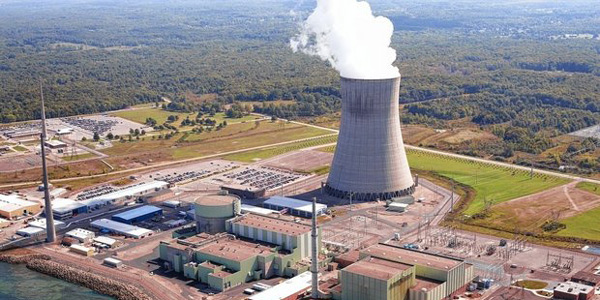A group of energy companies and trade groups filed a lawsuit calling New York's nuclear power plant subsidies unconstitutional.
By Ted Caddell and William Opalka
Despite its best efforts to avoid litigation, the New York Public Service Commission saw its Clean Energy Standard challenged in federal court Wednesday by a group of energy companies and trade groups calling the rule’s subsidies to several nuclear power plants unconstitutional.
The suit, filed in U.S. District Court for the Southern District of New York in Manhattan, claims the zero-emission credits (ZECs) intrude on FERC’s jurisdiction over interstate electricity transactions, asking the court to find them invalid and order the PSC to withdraw them from the CES.
The ZECs are “purely protectionist in nature, enacted for political reasons to save jobs at the subsidized generators and the property tax revenues there from,” said the plaintiffs, which include Dynegy, Eastern Generation, NRG Energy and the Electric Power Supply Association.
The CES, adopted by the PSC in August, mandated that New York obtain 50% of its power from renewable resources by 2030. The ZECs were seen as a way to keep the state’s nuclear plants operating while utility-scale renewables are built. The 12-year subsidies would help keep open Exelon’s R.E. Ginna and Nine Mile Point and Entergy’s James A. FitzPatrick plant, the sale of which to Exelon is pending regulatory approval.

Nine Mile Point | Constellation Energy Nuclear Group
When it issued its order, the PSC said it had revised it in a way that it believed would avoid legal issues that caused the U.S. Supreme Court to void a contract between Maryland and Competitive Power Ventures in Hughes v. Talen. (See NY Attempts to Thread Legal Needle with Clean Energy Standards, Nuke Incentives.) The court found the contract unconstitutional, as it was tied to prices in PJM’s capacity market, over which FERC has jurisdiction. The PSC instead tied the price of its ZECs to EPA’s social cost of carbon and the price of carbon allowances in the Regional Greenhouse Gas Initiative.
The plaintiffs, however, said the ZECs were still tethered to FERC-regulated wholesale energy prices and thus unconstitutional.
“Apparently recognizing that its original proposal was plainly unconstitutional under Hughes, the PSC staff hastily revised its recommendation in July 2016 and changed the formula for determining the amount of ZEC subsidies,” they said. “Although the new formula was ostensibly based upon a federal interagency working group’s ‘social cost of carbon,’ this was window dressing, changing the name but not the intent to replace the FERC-determined energy price with a state-determined energy price.”
The plaintiffs argued that the subsidies disadvantage out-of-state generators who participate in NYISO’s markets.
“The ZEC order is directly discriminatory, as only specified New York nuclear facilities are eligible to receive ZECs,” they said. “Although states have the right to regulate the retail sale of electricity within their own borders, the wholesale sale of electricity involves interstate commerce, which the state may not regulate. NYISO’s wholesale marketers are interstate and international in nature, as they involve the sale and transmission of energy and capacity from generators located in other states and in Canada, and the purchase of such commodities by customers in other states.”
They also claimed that the ZECs could inhibit competition because they “would cause more efficient interstate generators to leave the market and discourage the entry of new competitors.”
Proponents of the CES were quick to denounce the suit.
“This lawsuit, filed by gas, oil and coal generators, is blatantly putting specific business interests ahead of what is best for New York,” said Gary Toth, vice chair of the County of Oswego Industrial Development Agency.
“Today’s lawsuit … is wholly inconsistent with the values of the countless New Yorkers who want to achieve a clean energy future,” said Ted Skerpon, chairman of the IBEW Utility Labor Council of New York.
“The bottom line here is that eliminating the nuclear provision from the CES will cause electricity prices to spike and will put thousands of New Yorkers out of work,” said Gregory Lancette, president of the Central-Northern New York Building and Construction Trades Council.
“Ultimately, if upstate nuclear plants close, it is the generation facilities that burn coal, oil, and gas that will benefit from the electricity price spikes that would result,” said Dave Young, president of the Rochester Building & Construction Trades Council.
Downstate Legislators Blast ZECs Again
On Monday, a group of New York City-area legislators again blasted the ZECs in a second letter sent to the PSC.
The legislators, now numbering seven, also said the PSC’s response to their first letter mischaracterized their opposition. (See New York Legislators Question Nuclear Subsidy.) They said they support the standard’s renewables goal but contend that the $965 million ratepayers will spend on the subsidies over the first two years of the program will be disproportionately borne by downstate ratepayers. They again called for the cost review of the power plants’ operating costs to be made public.

Audrey Zibelman, NY PSC Chair © RTO Insider
“The commission has kept the cost review concealed from the public, presumably on the grounds that the costs of the nuclear plants are trade secrets, but the commission in its order acknowledged there was little competition involved,” the letter states. “Upon sale of the FitzPatrick plant, Exelon/Constellation will become nearly the exclusive owner. Accordingly, there is no justification for withholding this information on the basis that the costs are protected trade secrets.”
The PSC responded to the first letter by saying the benefits of low emissions are shared statewide. It also has said the move toward a low-carbon energy portfolio would suffer if the nuclear plants retired prematurely.



